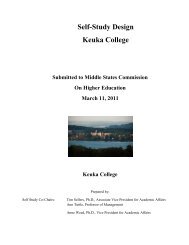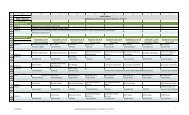final version of the self-study document - Keuka College's Middle ...
final version of the self-study document - Keuka College's Middle ...
final version of the self-study document - Keuka College's Middle ...
You also want an ePaper? Increase the reach of your titles
YUMPU automatically turns print PDFs into web optimized ePapers that Google loves.
Introduction<br />
<strong>Keuka</strong> College, on <strong>the</strong> shores <strong>of</strong> <strong>Keuka</strong> Lake in New York State’s Finger Lakes region, was<br />
founded in 1890 as <strong>the</strong> <strong>Keuka</strong> Institute, a coeducational preparatory college dedicated to serving<br />
<strong>the</strong> educational needs <strong>of</strong> rural youth. Its motto <strong>the</strong>n, “committed teachers and scholars devoted<br />
to providing maximum attention to <strong>the</strong> individual student,” remains <strong>Keuka</strong>’s philosophy, as<br />
underscored in its mission statement. This commitment to student success is at <strong>the</strong> heart <strong>of</strong><br />
<strong>Keuka</strong>’s endeavors, although <strong>the</strong> College has expanded its mission and educational program<br />
beyond serving rural youth to meeting <strong>the</strong> educational needs <strong>of</strong> a diverse group <strong>of</strong> learners,<br />
including adult, traditional, online, and international students. As this <strong>self</strong>-<strong>study</strong> will <strong>document</strong>,<br />
<strong>Keuka</strong> has done an excellent job <strong>of</strong> fulfilling its mission to provide a supportive and<br />
intellectually challenging educational experience to a diverse group <strong>of</strong> learners.<br />
<strong>Keuka</strong> <strong>of</strong>fers 30 bachelor’s degree programs on its home campus at <strong>Keuka</strong> Park, many with<br />
specialized concentrations; 27 minors; and <strong>self</strong>-designed majors. Four master’s degree programs<br />
are <strong>of</strong>fered at <strong>the</strong> home campus, in Occupational Therapy, Literacy (B-6 and 5-12), and a Master<br />
<strong>of</strong> Science in Management—International Business concentration. Through its Accelerated<br />
Studies for Adults Program (ASAP), <strong>the</strong> College <strong>of</strong>fers bachelor’s degree completion programs<br />
in organizational management, criminal justice systems, social work, and nursing, as well as<br />
master’s degrees in management, criminal justice administration, and nursing at sites across New<br />
York state. The College also extends educational opportunities via <strong>the</strong> Internet through its<br />
Wertman Office <strong>of</strong> Distance Education.<br />
The Self-Study process got underway in fall 2010, with <strong>the</strong> appointment by President Joseph G.<br />
Burke, Ph.D. <strong>of</strong> an eleven-person <strong>Middle</strong> States Self-Study Steering Committee, to be chaired by<br />
Dr. Tim Sellers, <strong>the</strong> Associate Vice President for Academic Programs and faculty member Ann<br />
Tuttle, Pr<strong>of</strong>essor <strong>of</strong> Business and Management. The Committee and <strong>the</strong>ir respective working<br />
groups are comprised <strong>of</strong> representatives from <strong>the</strong> key functional areas <strong>of</strong> <strong>the</strong> College: faculty,<br />
finance, admissions, student affairs, pr<strong>of</strong>essional studies, students, and trustees.<br />
Some members <strong>of</strong> <strong>the</strong> Steering Committee engaged in training relevant to <strong>the</strong> Self-Study and<br />
Reaccreditation process. This training included attendance by Anne Weed, Vice President for<br />
Academic Affairs, and Tim Sellers, Associate Vice President for Academic Programs, at a<br />
number <strong>of</strong> MSCHE events: “A Basic Toolbox for Assessing Institutional Effectiveness” in<br />
August 2010, “Meeting <strong>Middle</strong> States Expectations for Student Learning Assessment” in<br />
September 2010, <strong>the</strong> MSCHE Self-Study Institute in November 201, <strong>the</strong> 2011 MSCHE Annual<br />
Meeting (Tim Sellers), “Integrating Planning and Assessment” in April 2012, and <strong>the</strong> 2012<br />
MSCHE Annual Meeting, including Dorothy Schramm, Director <strong>of</strong> Institutional Assessment.<br />
The o<strong>the</strong>r members <strong>of</strong> <strong>the</strong> steering committee also participated in training through a joint retreat<br />
with members <strong>of</strong> <strong>the</strong> administration in October, facilitated by a <strong>Middle</strong> States Self-Study<br />
consultant. At this retreat, <strong>the</strong> Committee discussed communication strategies, College<br />
community readiness for participation in <strong>self</strong>-<strong>study</strong>, key institutional issues, and <strong>self</strong>-<strong>study</strong><br />
outcomes.<br />
The <strong>Middle</strong> States Steering Committee began meeting in September 2010, and at <strong>the</strong> Steering<br />
Committee’s first meeting, <strong>the</strong> committee members began to review <strong>the</strong> College’s mission<br />
statement as a first step in understanding <strong>the</strong> nature and scope <strong>of</strong> <strong>the</strong> <strong>self</strong>-<strong>study</strong> process. In<br />
Page 1 <strong>of</strong> 8 Introduction




